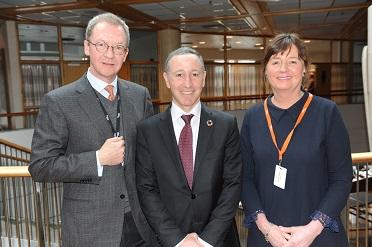
(from left) Idar Kreutzer, CEO of Finance Norway, Robert Glasser, head of UNISDR, and Cecilie Daae, Director, Norwegian Directorate for Civil Protection (DSB)
By Rosalind Cook
OSLO, 26 February, 2018 - Norway is launching a new public-private partnership to boost action on disaster prevention and disaster risk reduction in a collaboration between civil protection and the insurance industry.
The Norwegian Directorate for Civil Protection (DSB) and Finance Norway, the industry association for the finance sector in Norway, signed the agreement in the presence of UNISDR at a major conference this month in Oslo on “Future Challenges - Are We Prepared”.
The Agreement focuses on exchange of damage data and cross-fertilization with DSB’s Knowledge Bank (Kunnskapsbank) and results from a long-term collaboration between DSB and Finance Norway. The data will be used in DSB's Knowledge Bank, which compiles data in the field of social security to support strengthening the work of municipalities and county councils in preventing disasters.
The agreement is primarily related to the work on prevention of direct damages at the local level, but the parties are open for expansion. Director Cecilie Daae of the Norwegian Directorate for Civil Protection (DSB), pointed to the strong added value of the partnership.
“Finance Norway and insurance companies have a lot of knowledge about risk, vulnerable areas and damages across society. This is knowledge that is very valuable for DSB's work,” she said.
“We have high ambitions,” said Idar Kreutzer, CEO of Finance Norway on signing the agreement and pointed to climate change as one of the greatest threats. The World Bank estimates that disasters cost the global economy US$520 billion annually. In Norway last year compensation from insurance companies related to flooding and other natural hazards, amounted to 1.2 billion Norwegian krone (about $168 million).
The real costs are likely to be even higher as there are no statistics on loss and damage due to cascading impacts such as business interruption, transport disruption, electricity blackouts and damage to critical infrastructure.
Robert Glasser, the Secretary-General’s Special Representative for Disaster Risk Reduction, welcomed the initiative saying: “Norway is continuing to show leadership and this is a great example of joining forces to harness the potential of data and technology to implement the Sendai Framework at national and local levels.”